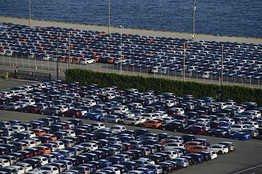(单词翻译:单击)

Higher energy imports played a role in Japan's record current-account deficit in November. But the data is a sign of a more fundamental change: that Japan's three decades as one of the world's biggest exporters may be over.
能源进口增加是日本11月出现创纪录经常项目赤字的一个原因。但该数据也反映了一个更根本的变化:日本长达30年的出口大国地位可能不保。
Since the 1980s until 2010 Japan exported more than it imported, supplying the world with electronics, machinery and other goods.
从1980年代到2010年,日本的出口一直超过进口,向全世界出口电子产品、机械以及其他商品。
That changed in 2011, after the Fukushima nuclear disaster. Japan's nuclear power plants shut down, pushing up imports of other fuel and tipping the trade balance into deficit.
但在2011年福岛核灾难发生后,情况发生了变化。日本关闭了核电厂并加大了对其他燃料的进口,日本贸易也由此转为逆差。
Those reactors remain closed and Japan's huge fuel imports, compounded by the weak yen, are widening the trade deficit.
这些核反应堆仍处于关闭状态。而日本庞大的燃料进口加上疲软的日圆,正导致该国的贸易逆差不断扩大。
But even stripping out fuel, Japan would be running a meager trade surplus at best. A major factor is that Japanese companies have moved production offshore, to cheaper centers in China and elsewhere.
但即便剔除燃料进口,日本充其量也只能实现少许贸易顺差。一个主要原因是日本企业已纷纷将生产迁到海外,搬到中国等生产成本更低的地方。
Those goods show up in the export statistics from, say, China, not Japan. Japan's ambitious monetary easing, meant to weaken the yen and lure companies back onshore, so far has failed to entice firms back.
如此一来,这些产品就出现在他国(例如中国)的出口统计中,而不是日本。日本此前推出了宏伟的货币放松政策,旨在压低日圆汇率、吸引企业回归本土生产,但到目前为止,这一策略并未奏效。
'Only a small number of companies brought back factories to Japan as the yen weakened,' said Junko Nishioka, an economist with RBS Securities in Tokyo.
苏格兰皇家银行证券(RBS Securities)驻东京的经济学家Junko Nishioka说,随着日圆走软,只有少数公司把海外工厂迁回了日本国内。
Japanese exporters also are having a hard time competing with other nations, especially in the smartphone market. Japanese consumers are now increasingly buying imported goods such as electronics that were once the mainstay of the nation's exports.
与此同时,日本出口商在国际上也面临着很大的竞争压力,特别是在智能手机市场。眼下在日本,购买进口电子产品等进口商品的消费者越来越多。而电子产品一度是日本出口的支柱。
'There's a loss of competitiveness of Japanese manufacturing,' said Izumi Devalier, an economist at HSBC in Hong Kong.
汇丰(HSBC)驻香港的经济学家Izumi Devalier说,日本制造的产品正在失去竞争力。
That's showing up in weak export numbers. Exports in yen terms are expected to rise 9.8% in the current fiscal year, but that gain is largely due to a weaker currency making earnings look larger in yen-terms, according to the Japan Foreign Trade Council. Imports, meanwhile, will rise 14.1%, driven by higher fuel needs, the council estimates.
这在日本疲软的出口数据上得到显现。日本贸易会(Japan Foreign Trade Council)认为,截至3月底的当前财政年度以日圆计价的日本出口额预计将增长9.8%,但这主要是由于日圆走软使出口所得外汇能兑换成更多日圆。与此同时,日本贸易会预计,受燃料需求增加推动,进口将增长14.1%。
The value of liquefied natural gas imports will likely rise 13.9% in the current fiscal year through end March, but imported devices like smartphones will rise 25.7%, cars 14.6% and clothing 24.8%, according to JFTC forecasts.
日本贸易会的预测显示,当前财年日本液化天然气进口额可能增加13.9%,智能手机等设备的进口将增加25.7%,汽车和服装进口额分别增加14.6%和24.8%。
The current account, which measures trade and net income flows, should turn back to positive territory in the second quarter this year, many economists say. But that's largely due to sizeable earnings from overseas investments, which will help mask a continued trade deficit.
许多经济学家认为,日本经常项目应该会在今年第二季度重新取得盈余。不过,这将主要得益于大量海外投资收益帮助掩盖持续的贸易逆差。
'In the 2000s, Japan earned income from the twin trade and income surpluses, but we're in a new structure, where a surplus in the income account makes up for a trade deficit,' said Sojitz Research Institute chief economist Tatsuhiko Yoshizaki.
Sojitz Research Institute首席经济学家Tatsuhiko Yoshizaki表示,本世纪头十年,日本同时取得贸易顺差和海外投资收益,而目前的新情况是需要用海外投资收益来填补贸易逆差。
Turning the nuclear reactors back on -- which is still the subject of heated political debate -- could help narrow the trade deficit by reducing fuel imports. But even here, the effect is likely to be limited.
如果日本的核电站重新投入运营(这仍是激烈的政治辩论的话题),则燃料进口将减少,从而帮助缩小贸易逆差。不过,即便核电站重新投入使用,带来的影响可能也将有限。
Hiromichi Shirakawa, chief economist at Credit Suisse in Tokyo, said that would help reduce the gap, but it would 'not be enough to change the course' of Japan's trade patterns.
瑞士信贷(Credit Suisse)驻东京的首席经济学家Hiromichi Shirakawa表示,核电站重新启动将帮助缩小缺口,但不足以改变日本的贸易格局。
For Japan, these issues have various impacts. The government wants more business to come back onshore, raising wages and consumption and ending years of deflation. If this doesn't happen, Japan's economy might sink back into the doldrums.
对于日本来说,以上这些问题具有不同的影响。日本政府希望看到的是更多企业回归本土、工资和消费水平上升、多年通缩局面结束。如果情况没能如此,日本经济可能会重新陷入低迷。
In economic terms, a large current-account deficit means a gap between savings and investment. That could mean Japan has to rely more on foreign investors to fund the gap in the future, a risky strategy for a country with one of the world's largest stocks of public debt.
从经济角度讲,较大经常项目赤字意味着储蓄和投资之间存在缺口。这进而意味着未来日本可能不得不更多地依赖海外投资者填补这一缺口。考虑到日本的公共债务规模全球领先,这将是一个高风险的策略。


